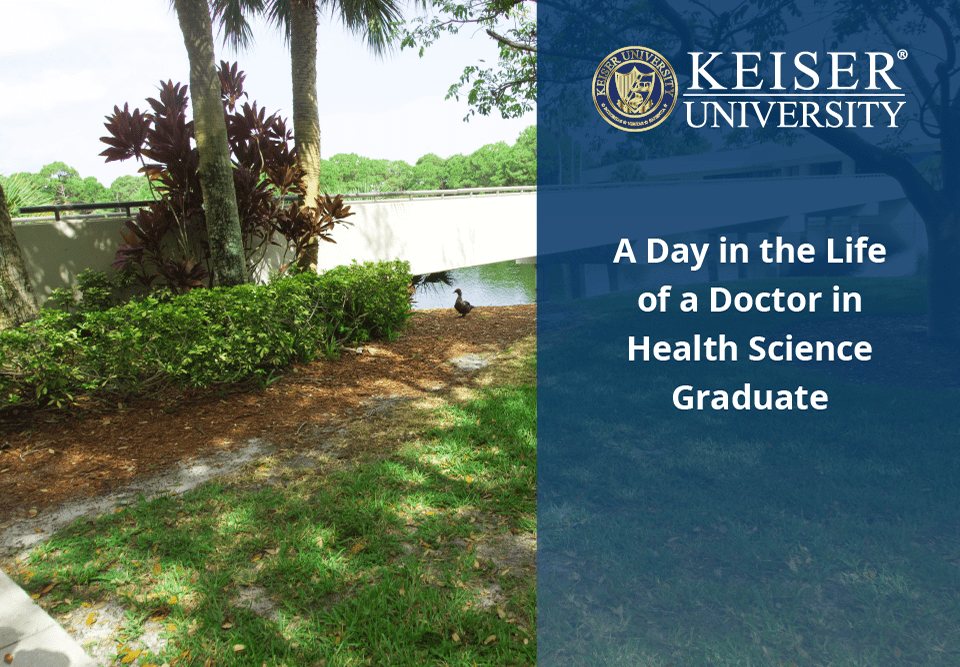If you already have a master’s degree in health science or a related field, and you are interested in advancing your education even further, you might have thought about returning to school for your Doctor of Health Science (DHSc) degree. Whether you envision yourself working in clinical practice, healthcare administration or even teaching, the right education could help you build the foundational skills and knowledge needed to make a real difference in the lives of others.
So, what does a Doctor of Health Science degree entail — and what does a day in a life of a health science graduate look like? We delve into this and much more below, so you can determine whether a DHSc degree may be suitable for you.
What Is a DHSc Degree?
A Doctor of Health Science is a graduate-level degree that aims to prepare students for more advanced degrees in healthcare management, education and clinical practice. A previous degree at the graduate level is typically required for admission to a DHSc program, and programs may consist of anywhere from 45 to 70 credit hours. At Keiser University, for example, the DHSc program is 51 credits.
Compared to a more “traditional” PhD, which heavily emphasizes research and theory, a DHSc tends to be more focused on practical application — making it an excellent choice for those wanting to make a direct impact in the field.
Core Curriculum and Skill Development
The exact curriculum of a DHSc degree program will vary from one school to the next. However, these programs tend to be divided into core credit hours, research credit hours and a dissertation. Some programs may require students to complete a doctoral residency prior to starting a dissertation as well.
Examples of the essential topics covered in a DHSc degree program include:
- Research writing
- Management and leadership
- Quantitative research methods and analysis
- Survey research methods
- Health policy and health economics
- Population health/Community health/Global health
- Health informatics
During a DHSc degree program, students can expect to develop the competencies necessary to advance into educator, administration, clinical and other leadership roles in the field. Some specific skills focused on in such a program may include:
- Research
- Data analysis
- Health leadership/management
- Problem-solving
- Communication
Who Pursues a Doctor of Health Science (DHSc) Degree?
Anyone with a relevant master’s degree or doctoral degree from an accredited institution can be considered for admission into a DHSc degree program. However, this type of program tends to be best suited for experienced clinicians looking to move into advanced administration, research or educational roles.
Seasoned Clinicians Seeking Leadership or Academic Roles
Healthcare professionals with ample experience in clinical roles (including nurses, physical therapists, occupational therapists and physicians’ assistants) often pursue DHSc degrees when they are ready to take their careers to the next level. Often, these professionals are seeking a program that offers a combination of both theory and practice — preparing them to explore roles in leadership, advanced healthcare research, education and the like.
Still trying to determine if a DHSc program aligns with your professional goals? Explore a few different career possibilities for DHSc graduates below to get a better feel for whether you can envision yourself in any of these fulfilling roles.
Scenario 1: A Day in the Life of a DHSc as a Healthcare Administrator
Some DHSc graduates will go on to work as leaders in healthcare administration. Playing a pivotal part in financial management, operations and strategic planning, these professionals are responsible for the oversight of healthcare departments or even entire healthcare organizations.
What does a day in a life of a healthcare administrator with a DHSc degree look like? While no two days are exactly the same, healthcare administrators dedicate much time to reviewing data, researching/implementing new policies and collaborating with others.
Morning: Strategic Planning and Data Review
Upon arriving at work, a healthcare administrator may perform an initial review of the facility’s organizational performance metrics — including important patient flow data and other quality indicators. From there, they may spend the remainder of the morning meeting with department heads and other decision-makers within the organization to discuss operational challenges and brainstorm potential solutions.
Mid-Day: Policy Implementation and Team Development
Next, a healthcare administrator may pivot toward working on new policies or reviewing existing protocols for areas of improvement. When developing new policies or revising old ones, these professionals rely heavily on evidence-based research — though they may also take into account unique facility data and their own findings. Throughout the afternoon, they might meet with staff to provide mentorship opportunities or lead interdisciplinary team meetings to optimize pathways to patient care.
Afternoon: Stakeholder Engagement and Innovation
Later in the day, a healthcare administrator may shift their focus to meeting with external partners, including community leaders and technology vendors. During these meetings, healthcare administrators might explore and discuss innovative solutions designed to improve healthcare delivery or patient access within their facilities.
Scenario 2: A Day in the Life of a DHSc as a Health Educator
If working as a health educator would be more up your alley, it can be helpful to gain some insight into what a typical day looks like in this type of role. Healthcare educators can work in a wide range of health settings, from hospitals and clinics to public schools and colleges or universities. In some cases, health educators may even work in community and government settings.
As you might imagine, the everyday work of a health educator can vary depending on the unique setting — but most of these professionals spend portions of their days developing curricula, preparing for lectures, engaging with students and conducting independent research.
Morning: Curriculum Development and Lecture Preparation
To start out, a health educator may sit in their office to review and update course materials for a specific health science program. This may include preparing engaging lectures or simulation exercises to keep students’ attention during class while teaching key concepts.
Mid-Day: Teaching, Mentoring and Student Engagement
Later in the day, health educators might move into teaching by delivering lectures or overseeing lab sessions with students. As part of the teaching experience, these professionals may also work to encourage open discussion, dialogue and idea-sharing between students. Additionally, health educators may open up their offices to meet with individual students for mentorship (or academic advising, in a college/university setting).
Afternoon: Research, Scholarship and Program Development
After teaching and meeting with students, it is not uncommon for health educators to spend the rest of their days working on their own applied research projects. These projects, which are relevant to healthcare education or practice, often entail collaborating with colleagues on departmental initiatives or working to maintain program accreditation.
Scenario 3: A Day in the Life of a DHSc as a Public Health Consultant
Another potential role for graduates of DHSc degree programs to consider is that of public health consultant. These professionals carry out the vital work of advising communities and organizations on initiatives and methods that can enhance public health and wellness. They may work for research institutions, nonprofits, government agencies and even private consulting firms.
Morning: Data Analysis and Epidemiological Review
During the first part of the day, a public health consultant may review and analyze large data sets related to current public health trends, including disease outbreaks or health disparities. This may include preparing reports or presentations on their findings for review by public health officials.
Mid-Day: Program Evaluation and Community Engagement
As the day progresses, a public health consultant may sit down to review existing public health interventions or community-based programs. During this time, these professionals aim to assess the overall effectiveness of these programs — collaborating with community organizations to identify health needs, develop solutions and make recommendations for program improvement.
Afternoon: Policy Recommendations and Advocacy
By afternoon, a public health consultant may get to work on developing evidence-based recommendations for healthcare policy changes. This might mean presenting their findings to policymakers or advocating for specific health initiatives within their communities.
Learn More About the DHSc Program From Our Graduate, Dr. Felecia Sotilleo
Keiser University is proud to offer a Doctor of Health Science program that is career-driven and student-focused. While you can learn plenty about our program (and related programs) on our website, exploring testimonials from real graduates can also be helpful in determining whether this program could be a good fit for you.
We recently interviewed Keiser University DHSc graduate Dr. Felecia Sotilleo to discuss her experience in the program. She commented that her most memorable experience at Keiser was her residency, where she had the opportunity to build relationships with colleagues, fellow students and mentors that have continued through her graduation.
When asked what she enjoyed most about the program, she replied that it was the “mentorship and support that came forth from the instructors, as well as from my mentors and my dissertation chair.” She proceeded to explain how she was impressed by the professionalism of her instructors, plus the warm and supportive environment that made her feel confident she had made the right choice.
Post-graduation, Felecia plans to apply her degree to develop her own healthcare agency.
Explore Graduate Programs at Keiser University
From rewarding roles in public health to fulfilling health education and health administration positions, a DHSc degree can equip you for any number of advancement opportunities. And when it comes to taking your education to the next level with a DHSc, where you complete your program matters.
At Keiser University, our Doctor of Health Science degree delivers a career-focused curriculum that can prepare students to advance in health-related administration, clinical practice or teaching roles. With coursework covering core topics such as project management, organizational behavior, research and evidence-based standards, students can complete this program online in just 20 to 38 months.
Learn more about Keiser’s DHSc degree program by getting in touch with a graduate admissions counselor, or take the next step by filling out your application for admission today.






 The instructors at Keiser University impacted my life. They believed in my ability to become a great graphic designer, regardless of how I felt about my skills. KU helped to prepare me for the real world and got me to where I am today.
The instructors at Keiser University impacted my life. They believed in my ability to become a great graphic designer, regardless of how I felt about my skills. KU helped to prepare me for the real world and got me to where I am today.
